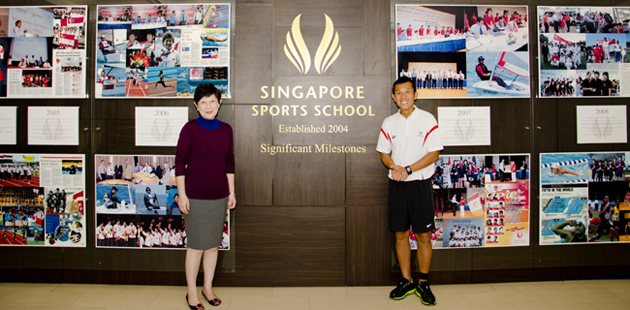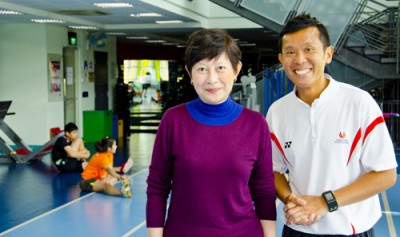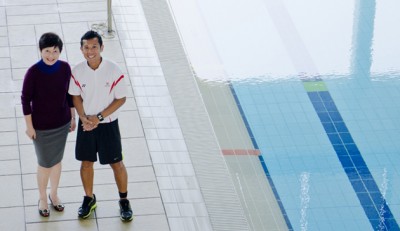Young Children’s Voices in Mathematical Problem Solving
Contributed by Dr Ho Siew Yin and Sng Wei Qin Abbie, from NTUC First Campus, for SingTeach Virtual […]
Read More
The simple act of skipping may seem like child’s play to some, but not everyone skips the same way, or knows how to skip well. To educators at the Singapore Sports School, nothing is taken for granted. It’s not just about physical training, it’s also about championing learning.
While keeping fit is the ultimate goal of Physical Education (PE), the teachers at the Singapore Sports School (SSP) believe it also presents many opportunities for learning.
They want their students to learn games concepts, acquire skills and gain multi-sports exposure. At the same time, character development is also deliberately factored into each and every PE lesson.

“Learned Champions with Character” is SSP’s motto. They aim to nurture all-rounded student-athletes who excel in both academics and sports. Juggling academics and sports has become a natural part of their students’ lives, as they are expected to maintain a high level of performance in both areas.
To develop sports-knowledgeable student-athletes, all lower secondary students are put through a customized PE programme called SportSmart Skills. This 2-year programme brings them back to basics, by focusing on the fundamentals of sports.
“We are looking at things like agility, balance, speed and co-ordination (the ABCs),” explains Mr Rodney Yeo, who is Head, Physical Education and Development at SSP, and the architect behind this programme. Besides these fundamental movement skills, they also teach fundamental motor skills like locomotion, object manipulation and stability.
These skills are taught in the first year of the programme so that the student-athletes are equipped with the knowledge and skills that will allow them to enhance their sports skills. First-year modules include Athletics (RJT – Run, Jump, Throw), Gymnastics, Dance, Aquatics and Basic Sports Science education.
When they can appreciate these fundamentals, games concepts, tactics and the sport’s principles are then introduced in the second year to ensure in-depth understanding.
 Principal Mrs Deborah Tan believes that, “If you apply a principle well in practice, and you have a clear understanding of what constitutes ‘good deliberate practice’, you can help move a child from a state of giftedness (their potential) into an expressed talent.”
Principal Mrs Deborah Tan believes that, “If you apply a principle well in practice, and you have a clear understanding of what constitutes ‘good deliberate practice’, you can help move a child from a state of giftedness (their potential) into an expressed talent.”
By and large, this idea may be applied to the domains of both sports and academic disciplines.
Through playing sports regularly, these student-athletes can develop a high level of metacognition. This helps them view aspects of training and competition experiences from various perspectives. It also provides them with opportunities to question assumptions and a basis for decisions made on the court or the playing field.
“A good grasp of games concept and a critical analysis of evidence and feedback gathered from training or competitions have helped student-athletes evaluate their own training and performance more effectively,” notes Mrs Tan.
“Significant improvements in their performance are usually preceded or accompanied by the ‘Aha! moment’, when they gain insights into the way they play the sport,” she adds. “These skills are transferable to academic disciplines.”
To broaden their understanding of skills transference, these student-athletes are exposed to other games and sports beyond their main sport. This multi-sports exposure helps them raise their ceiling of athletic achievements. At the same time, it develops them multilaterally so that they can apply the learnt skills and knowledge to their current sport involvement.
“I want my students to be a competent mover,” says Rodney. “If I ask you to kick a ball or pick up a racket, you will do it – and you will do it confidently!”
To achieve this, during the school’s off-peak competition season, the student-athletes are taken through a Cluster Sports programme. This programme exposes the student-athletes to complementary sports and activities, which allows them to acquire relevant skills and concepts which are applicable to their chosen sport.
This transference of skills helps them better their performance in their own sport. In addition, it serves to further motivate them. For example, Badminton players may be taught the triple jump, with a focus on the triple extension and co-ordination, which can be transferred to the playing of Badminton.
In the course of multi-sports exposure, some student-athletes have discovered new talents in other sports. One such student joined SSP as an endurance runner and was eventually discovered to be a good shooter.
“Her temperament, with a slow heart-beat rate and psychological make-up, fit very well. She has everything that makes a good shooter,” shares Rodney. She was given the option to make the change – and she did. Today, she is one of the school’s best shooters and is representing the national youth team.
All student-athletes are given every encouragement – and the time – to train in their specialized sports. “What is unique about our school is the integration and customization of programmes, and this is applied across sports, academics, and boarding,” says Mrs Tan.
 A typical day in SSP starts at 6.30am and ends at 10pm. This includes the provision of seven meals a day, academic classes including remediation and make-up lessons, supervised study-time in the evenings, and sports trainings.
A typical day in SSP starts at 6.30am and ends at 10pm. This includes the provision of seven meals a day, academic classes including remediation and make-up lessons, supervised study-time in the evenings, and sports trainings.
About 95% of the students opt to stay on campus. The boarding facilities allow closer collaborations among the student-athletes and the teachers. Small groups of 10–15 student-athletes are assigned a teacher-mentor, who monitors closely the development of the whole-child from the time of enrolment till graduation.
As the students are enrolled to the school as young as 12, and they can board for as long as 6 years, the teachers literally watch them grow up. The quality of engagement between teacher-mentors and student-athletes – as well as with coaches and parents – is usually very positive and the level of trust is often high.
“Every child who feels secure will generally progress well in whatever they are potentially good at,” notes Mrs Tan.
With the holistic education provided at SSP, these student-athletes can enjoy the many life opportunities that present themselves in both sports and studies. And for Rodney, “It makes coming to school worthwhile because you know you are coming in to impact the life of another young child.”
Useful Resources
Here are examples of SSP’s Lesson Plan and Fundamental Motor Skills (FMS) curriculum and rubrics.